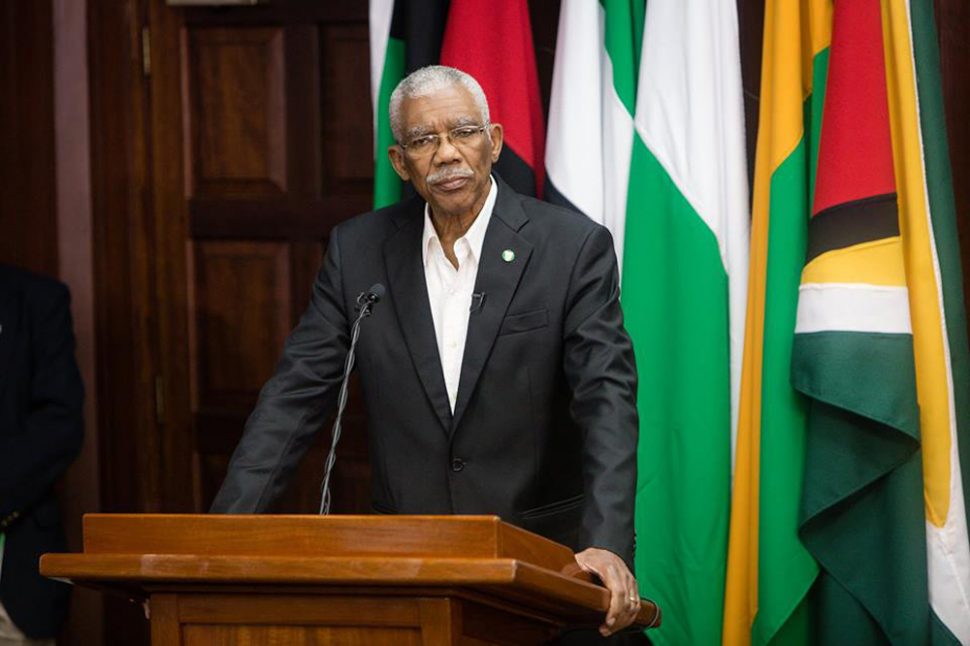Noting that the Carter-Price Formula has outlived its usefulness, President David Granger said on Friday that he favours the involvement of the National Assembly in determining the composition of the Guyana Elections Commission (GECOM).
“We are still working under the Carter formula, which is generally agreed to have exhausted its usefulness and it’s like having a cricket match with one umpire from each team. It is not a formula for consensus. It is almost a formula for gridlock. So, there needs to be a change and like other commissions we need to establish new rules,” he said during a press conference on Friday at the Ministry of the Presidency.
The formula affords the two major political parties equal representation on the commission and an appointed chair who enjoys the confidence of both sides. It provides for the appointment of the six members of the commission—three appointed by the President, acting in his own deliberate judgement; and three appointed by the President acting on the advice of the Opposition Leader after meaningful consultation with the opposition parties represented in the National Assembly. Up until the appointment of the current GECOM Chairman, the Chairman was appointed from a list of six persons, who are not unacceptable to the President, submitted by the Opposition Leader after he would have meaningfully consulted with the non-government political parties represented in the Assembly. The constitution caters for a unilateral appointment by the president in prescribed circumstances.
While making it clear that no proposals have yet been made for the reform of GECOM, Granger said that while he favours this move, “we must adopt the architecture… the procedures which are in place for other constitutional commissions… so the reform of GECOM, just [like] you have at the Police Service Commission or the Public Service Commission, would depend on the nomination of human beings coming through the National Assembly and coming from political parties.”
Granger noted that the formula along with campaign financing and power sharing could be added to the agenda for several meetings he will be having with Opposition Leader Bharrat Jagdeo during this month. The president said thus far, the points which were raised with the Leader of the Opposition were mutually agreed. The agenda could be extended, he said, before adding that their engagement is meant to be continuous.
The two have already met several times this year, with the most recent occasion being last Thursday, regarding the appointment of a substantive Commissioner of Police and four Deputy Commissioners.
‘Too late’
As far as power sharing is concerned, Granger said that it is structurally “too late” to embark on a reconfiguration of the cabinet. “So what we have [is] soon after we got into office, there was a proposal that we should meet to discuss… inclusionary demo-cracy but there is no proposal on the table for power sharing, whatever that means, but certainly in terms of inclusionary democracy. You know the history of that and I would continue to engage the Leader of the Opposition to ensure that important elements in society and the economy are discussed and we share ideas,” he said.
According to Granger, it is probably better to say that there is an “idea sharing” proposal rather than a power sharing proposal but “we [government] have no problem with engaging the opposition and all of my meetings with the Leader of the Opposition have been quite cordial and I expect that once we reengage… things will go much more quickly and much more smoothly.”
Regarding campaign financing, Granger indicated that he has not seen any draft legislation but stressed it will have to be agreed to by both sides of the political divide.
“…In campaign financing and power sharing this is something that would be discussed but we would always come back to the situation in which the main parties will have either through consensus or through convention or through constitutional change be required to make nominations. Once those nominations come from political parties, we can anticipate certain consequences,” he said.
Transparency Institute of Guyana Inc. (TIGI) has sounded a call for the urgent reformulation of campaign financing legislation, saying that it will not only curb corruption but ensure that democracy reigns.
“Political financing legislation should no longer be withheld from Guyana. The enactment of such laws will deal a significant blow to the scourge of corruption,” TIGI said in column published in the Stabroek News in January of this year.
The column was based on the statements of Treasurer of the AFC and Minister of Business Dominic Gaskin, Minister of State Joseph Harmon and Jagdeo, who had spoken to this newspaper last September.
Gaskin had described campaign financing as a complex issue and one which will always be shrouded in secrecy, given the environment of victimisation and fear that currently exists.
AFC Chairman Khemraj Ramjattan subsequently said that reform was actively being pursued and was a high priority the party.






